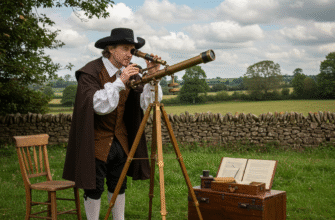The whispers of ancient Attica carry tales of gods walking verdant paths, their divine breath mingling with the mortal air. Among the mortals who trod these lands was Icarius, a man of humble spirit yet renowned for his unwavering piety and the warmth of his welcome. His home in Ikaria, a deme of Athens, was a sanctuary for any weary traveler, a testament to the sacred laws of xenia, or guest-friendship, that bound gods and men alike. It was this very virtue that drew the attention of a deity whose arrival would forever alter the course of Icarius’s life and etch his name, and that of his beloved daughter, into the celestial tapestry.
The Divine Visitor and a Revolutionary Gift
One sun-drenched afternoon, a stranger appeared at Icarius’s threshold. This was no ordinary wayfarer; it was Dionysus, the god of wine, ecstasy, and untamed nature, often journeying in disguise to observe the hearts of mortals. Icarius, true to his nature, received the god with open arms, offering the best of his meager stores. Pleased by this genuine hospitality, Dionysus chose to bestow upon Icarius a gift of unparalleled significance: the secret of winemaking. He revealed the mysteries of cultivating the grapevine, the patient art of coaxing forth its intoxicating fruit, and the transformative process of fermentation that turned simple juice into a drink capable of unlocking joy and sorrow in equal measure.
Icarius, filled with awe and gratitude, diligently learned the divine craft. Soon, his own vineyard flourished, and the first vintage of this miraculous beverage was ready. The wine, a deep crimson nectar, promised cheer and a temporary escape from the mundane. Its aroma alone was a potent invitation to revelry. Icarius, brimming with benevolent enthusiasm, felt compelled to share this divine blessing with his fellow countrymen, envisioning a world uplifted by its convivial spirit.
A Gift Misunderstood, A Life Extinguished
With a heart full of good intentions, Icarius loaded his cart with wineskins filled with the newly pressed wine and journeyed to the neighboring shepherds. These were simple folk, their lives dictated by the rhythms of their flocks and the harshness of the elements. He offered them the drink freely, explaining its divine origins and its power to bring delight. The shepherds, unfamiliar with such a potent libation, drank deeply. The effects were swift and bewildering. The world began to spin, their tongues grew heavy, and a strange, overwhelming sensation overcame them. In their unaccustomed state, they mistook the blissful intoxication for a malevolent poison.
Fear, fueled by ignorance and the disorienting effects of the alcohol, twisted into rage. Believing Icarius had intentionally sought to harm them, they turned on him with brutal ferocity. In a tragic irony, the man who sought to share joy became the victim of its first, misunderstood encounter. They clubbed him to death and, in haste, buried his body beneath a pine tree, or by some accounts, threw it into a well, hoping to conceal their terrible deed.
A Daughter’s Search, A Loyal Companion’s Grief
Back in Ikaria, Erigone, Icarius’s devoted daughter, awaited her father’s return. As hours turned into days, a chilling premonition settled upon her heart. Her anxiety was shared by Maera, Icarius’s faithful dog, whose keen senses perceived the tragedy that had befallen her master. The loyal hound, whining with sorrow, refused to eat or rest, eventually tugging at Erigone’s robe, urging her to follow.
Guided by the distraught Maera, Erigone embarked on a desperate search. The dog led her through familiar paths now shadowed by dread, until at last, she stopped at the very tree under which her father lay in his unmarked grave. Maera began to dig frantically, her paws unearthing the terrible truth. The sight of her murdered father, so cruelly taken, shattered Erigone’s world. Her grief was an abyss, a chasm of despair from which there seemed no escape.
The tale of Icarius and Erigone serves as a poignant reminder of the delicate balance between divine gifts and mortal understanding. Their tragic fate, culminating in their immortalization as constellations, highlights themes of innocence, betrayal, and enduring loyalty. This celestial commemoration ensured their story, intertwined with the introduction of wine to Attica, would be forever etched in the night sky.
The Weight of Sorrow and a Desperate Act
Overwhelmed by an unbearable sorrow and righteous fury, Erigone, standing beneath the branches of the tree that shaded her father’s final resting place, uttered a solemn curse upon the land of Attica, or perhaps specifically upon its young women, praying that they too might suffer as she had. Then, in a final act of despair, she fashioned a noose and hanged herself from the same tree. The faithful Maera, her heart broken by the loss of both her master and his daughter, either lay down beside Erigone and died of grief, or, in some tellings, threw herself from a cliff, unable to bear the weight of such profound loss.
Celestial Immortality: Justice in the Stars
The news of this triple tragedy eventually reached Dionysus. The god was filled with profound sadness for the fate of his hospitable host and his innocent daughter, and with rage towards the ignorant shepherds who had repaid kindness with violence. Determined that their memory should not fade into oblivion, Dionysus chose to honor them in a way befitting their virtues and their suffering. He raised them to the heavens, transforming them into constellations, eternal beacons in the night sky.
Icarius was transformed into the constellation Boötes, the Herdsman or Ploughman. He is often depicted chasing Ursa Major, the Great Bear, around the North Star, forever tending to the celestial sphere. His principal star, Arcturus, meaning “Guardian of the Bear,” is one of the brightest in the sky, a steadfast reminder of the man who first welcomed the god of wine to Attica.
Erigone, the grieving daughter, became the constellation Virgo, the Maiden. She is one of the largest constellations and a prominent member of the Zodiac. Often depicted holding a sheaf of wheat, represented by her brightest star, Spica (meaning “ear of grain”), Virgo symbolizes purity, innocence, and sometimes justice, or the harvest season that wine itself is a part of. Her tragic end is thus transmuted into an emblem of enduring, albeit sorrowful, maidenhood among the stars.
And what of Maera, the loyal dog? Her unwavering devotion did not go unrewarded. She was placed in the heavens as the constellation Canis Minor, the Lesser Dog. Her primary star, Procyon, means “before the dog,” as it rises shortly before Sirius, the “Dog Star” in Canis Major, heralding the arrival of the greater hound. Maera’s celestial presence stands as an eternal testament to the profound bond between humans and their animal companions.
The Atonement of Athens: The Aiora Festival
The tragedy did not end with the catasterism. Erigone’s dying curse, or perhaps the anger of Dionysus, soon manifested in Attica. A dreadful plague swept through the land, or, in a more thematically resonant version, a strange madness befell the young women of Athens, compelling them to hang themselves, mirroring Erigone’s own tragic end. Alarmed, the Athenians consulted the Oracle of Delphi to understand the cause of their suffering and seek a remedy.
The oracle revealed that the afflictions were a direct consequence of the unavenged deaths of Icarius and Erigone. To appease their spirits and lift the curse, the Athenians were instructed to find and punish the murderers of Icarius and to institute a festival in honor of Erigone. The shepherds were eventually found and brought to justice. More significantly, the festival known as the Aiora, or the Festival of Swings, was established.
During the Aiora, young Athenian women would swing on ropes hung from trees, a ritualistic reenactment of Erigone’s death by hanging. Small images, known as oscilla, were also hung from trees and swayed in the wind. These actions were intended to purify the land and propitiate the angry spirit of Erigone. The festival, though somber in its origins, also became associated with the ripening of grapes and the first tasting of new wine, linking back to Icarius and Dionysus’s gift. It was a poignant, yearly remembrance of profound loss and the search for communal healing.
Echoes Through Time
The story of Icarius and Erigone resonates with multiple layers of meaning. It is, on one level, a foundational myth explaining the introduction of wine and its potentially perilous effects if not approached with wisdom and moderation. It is a stark reminder of the dangers of mob mentality and the tragic consequences of misunderstanding. But more profoundly, it is a tale of innocence betrayed, of unwavering loyalty in the face of desolation, and of inconsolable grief. The transformation of their earthly suffering into celestial glory offers a glimmer of poetic justice, a promise that even the deepest sorrows can find a place of eternal remembrance. Their stars, twinkling in the velvet expanse of night, continue to narrate their ancient, tragic, and ultimately transcendent story to all who gaze upwards.









